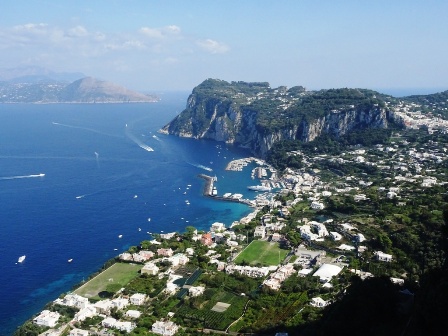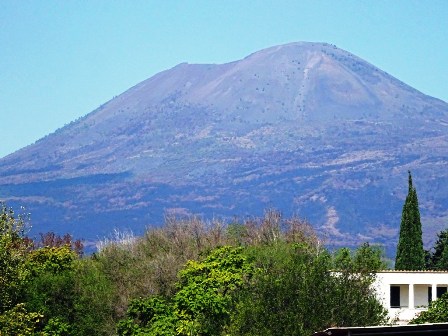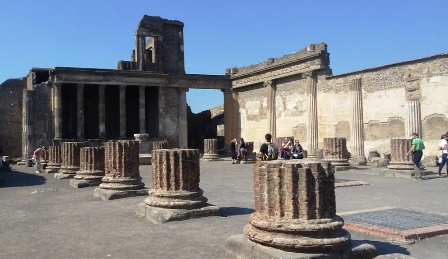|
It is easy to get to Capri from Naples or Sorrento. It was just 45
minutes from the SNAV dock in Naples to Marina Grande on Capri. From the
marina it was a short, scenic ride on the Funicular to Piazza Umberto I
in Capri Town. We didn’t spend much time in the town for we had a walk
to do that would lead us up to Monte Solaro and then down to Anacapri
town on our way back to Marina Grande. We saw a small group with a guide
who seemed to be headed the same direction as we were. They were the
only other people we saw on the trail until Monte Solaro. The trail went
through woods, heading ever upwards under steep cliffs above Capri Town.
If Ray and I were ever unsure of which path to take, we just watched for
the hiking group and knew we were on the right track.
At the top of the cliffs we had a great view to Marina Piccolo on
the south coast of the island. We could even see the famous rocky
pillars, the Faraglioni Stacks, near the marina. It was time for a rest
and our picnic lunch we had brought with us from Naples.
After lunch, we climbed upwards again to the lookout terrace on Monte
Solaro, where we joined all the other tourists who had taken a single
chair ride up to the lookout. For our descent, we took a stone steps and
a wide gravel path to Anacapri at the chair lift station. From there it
was down the 921 Phoenician Steps towards Marina Grande. Built between
the 6th and 7th C BC, the steps were once the only
way to get between Anacapri and Marina Grande until 1874. Originally it
was the women of Anacapri who walked down to the port every day and
carried back goods brought in by ship. Were the men too busy having
coffee and chatting with their friends?
Click
either photo above to see an Album for Vesuvius and Pompeii. Close the
window to return to this page.
Naples knows how to transport the thousands of
tourists who come every year to visit Vesuvius and Pompeii. The
Circumvesuviana train station was about a 10 minute from our hotel. The
train runs all
the way to Sorrento, with convenient stops for both tourists and
commuters along the way. The
Of course there were hoards of people walking with us, but there was plenty of room for
everyone. It took us about 35 minutes, including lots of stops for Ray
and I to take photos back to town and into the crater. On the other side
of the crater we could see a line of tourists walking with guides. It
looked like an interesting way to see Vesuvius but at is $200 US each,
including transport from Naples, it was too pricey for us and the 4 ½ hr
of walking was a bit daunting. We might have considered it if we were
younger.
Other tourists had told us they preferred the
smaller Herculaneum, a short distance from the base of Vesuvius. Yes,
Pompeii is huge and it is almost impossible to see everything in one
day, but the visit was certainly worthwhile.
Once again we took the Circumvesuviana train that stops just steps from the Pompeii ticket office and entrance. Of course there were hoards of tour groups and families visiting Pompeii. It was the weekend and locals are off work. That didn’t matter. The site was large enough for everybody. We marveled at the mosaics, frescoes and statues. We walked the crowded, narrow streets of the town, gazing into what were shops, small homes and mansions before Vesuvius erupted and destroyed the city in 79 AD. We toured the baths, a most civilized way to get cleansed and meet up with your friends. The huge forum, basilica, amphitheatre and theatres, both large and small were fascinating. We took lots of photos. Lunch was a good sandwich from the only restaurant/take-out on the site and we ate it sitting by the side of the road. We lasted until 4 PM when we called it quits and retreated to a cafe outside the archaeological park entrance.
We had time to relax
and enjoy fresh squeezed lemon and orange juice before finding our
shuttle bus driver who took us to Bomerano, in Agerola Commune, in the
hills of the Amalfi Coast. From Bomerano, we were to take three
differents day walks.
|
|||


